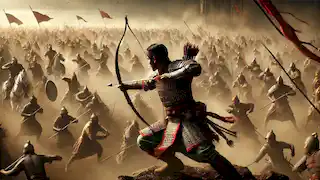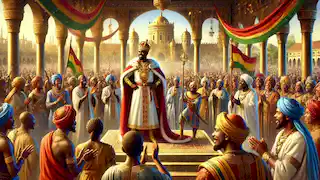Long ago, in the great empire of Mali, a legendary figure emerged from a land full of mystery, adventure, and power. This is the story of Sunjata Keita, a king born to lead his people into an era of prosperity, forever changing the course of West African history. The empire of Mali, known for its riches, cultural sophistication, and military might, traces its origins back to this heroic figure whose life became an inspiration for generations to come. This is not merely a story of battles and victories but one of resilience, destiny, and the power of unity. The story of Sunjata speaks to us about the strength of the human spirit, the will to overcome challenges, and the ultimate triumph of good over evil. In a small kingdom nestled within the Mandinka lands of West Africa, a ruler named Maghan Kon Fatta reigned. He was known for his wisdom and strength but also for a longing in his heart. Maghan had everything a king could desire, except for one thing – an heir. His first wife, Sassouma Bereté, had borne him no sons, and this troubled the king greatly. One day, a hunter came to his court with a prophecy that would change his life forever. "The king shall have a son, but not from the wife he now knows," the hunter said. "This son will become a mighty ruler, greater than any who have come before." Maghan Kon Fatta listened closely to the words of the hunter. He had heard rumors of a mysterious woman named Sogolon, whose beauty was said to be matched only by her strange and otherworldly power. Intrigued by the prophecy, the king sought out Sogolon. She was different from other women, known not for her beauty but for her fierce intelligence and spiritual strength. Maghan Kon Fatta took Sogolon as his second wife, and soon after, she became pregnant. As the months passed, it became clear that this child would be no ordinary baby. When Sunjata was born, he was a quiet and unremarkable boy, yet the people of the kingdom sensed something extraordinary about him. But there was one problem – Sunjata could not walk. Despite the prophecy that foretold his greatness, the young prince was ridiculed for his disability. His stepmother, Sassouma Bereté, scorned him and mocked his mother, saying, "How can a king be born from a cripple? He cannot even stand on his own two feet!" Sunjata’s mother, Sogolon, believed in her son, knowing that his time had not yet come. She protected him fiercely, though the kingdom’s doubt weighed heavily on her. The boy himself remained patient, sensing that his destiny was far from ordinary. As Sunjata grew, the tension in the kingdom intensified. Sassouma Bereté, jealous of Sogolon and fearful of Sunjata’s future power, sought to undermine him at every turn. She went so far as to scheme with court officials to ensure that her own son, Dankaran Touman, would take the throne after Maghan Kon Fatta’s death. Despite his inability to walk, Sunjata’s spirit was indomitable. He spent his days learning from griots, the storytellers and historians of the kingdom, absorbing the wisdom of his ancestors. He developed a sharp mind, and even though his legs could not yet carry him, he grew strong in his heart and soul. One day, when Sunjata was seven years old, his stepmother orchestrated a particularly humiliating situation. She ordered a great baobab tree be moved to the center of the village, knowing that Sunjata’s mother, Sogolon, liked to gather leaves from it for her cooking. Sogolon, weary from years of hardship, could not reach the tree, and Sassouma laughed as she watched her struggle. This act of cruelty finally awakened something deep inside Sunjata. He could no longer stand to see his mother suffer. He called upon his inner strength, summoned the power of his ancestors, and, with great effort, stood for the first time. The entire village gathered to witness this miracle. With shaking hands, Sunjata grasped the trunk of the baobab tree, uprooted it from the earth, and replanted it in front of his mother’s hut. The people were in awe. The boy who could not walk had now shown strength beyond what any could have imagined. Sassouma’s schemes were temporarily thwarted, but she knew Sunjata’s true power was emerging. From that day forward, the boy walked with confidence, and the prophecy of his greatness began to seem more and more inevitable. Despite Sunjata’s newfound strength, his troubles were far from over. Upon the death of Maghan Kon Fatta, the court, manipulated by Sassouma Bereté, installed Dankaran Touman as king instead of the rightful heir. Sunjata, Sogolon, and their supporters were forced into exile. The years of exile were difficult. Sunjata and his family wandered across many kingdoms, facing hunger, danger, and uncertainty. But even in exile, Sunjata continued to grow – not just in physical strength, but also in wisdom. He learned from the diverse cultures and peoples he encountered, absorbing their knowledge and building alliances. He became a leader, respected even by the kings of foreign lands. While in exile, Sunjata forged a powerful bond with the king of Mema, who treated him as a son and trained him in the arts of war. Sunjata grew into a formidable warrior and strategist, mastering the skills necessary to reclaim his homeland. But he never forgot the suffering of his people under the rule of Dankaran Touman and the cruelty of Sassouma Bereté. Meanwhile, back in Mali, the kingdom had fallen into chaos. A powerful sorcerer king named Soumaoro Kanté had risen, threatening to destroy everything in his path. His magical powers were so feared that even the rulers of neighboring lands trembled before him. Under Soumaoro’s reign of terror, the people of Mali cried out for a savior. News of this calamity reached Sunjata in his exile. The people of Mali had not forgotten the prophecy of the boy who would become a great king, and emissaries were sent to beg him to return and free his homeland from the clutches of Soumaoro Kanté. Sunjata accepted the call. Gathering an army of warriors and allies he had made during his years of exile, he returned to the land of his birth. The final battle for the soul of Mali was about to begin. Before facing Soumaoro, Sunjata sought the counsel of the griots and the wise men of his ancestors. They told him that Soumaoro could not be defeated by ordinary weapons. The sorcerer king had cast powerful spells to protect himself, and only by unraveling his magic could Sunjata hope to win. Armed with this knowledge, Sunjata prepared for the ultimate showdown with Soumaoro Kanté. The decisive battle between Sunjata and Soumaoro took place on the plains of Kirina. Sunjata’s forces, though smaller in number, were bolstered by his strategic genius and the righteous cause for which they fought. The people of Mali rallied behind him, believing in his destined victory. Soumaoro’s forces were overwhelming, but Sunjata had a secret weapon: a magical arrow crafted by the smiths of the land, imbued with the power to pierce Soumaoro’s enchantments. On the battlefield, Sunjata and his allies fought bravely, and the clash of swords echoed through the land. At the critical moment, Sunjata fired the magical arrow at Soumaoro. The arrow struck true, breaking the sorcerer king’s protective spell. Soumaoro, stripped of his magic, fled in terror. His forces, leaderless and confused, were swiftly defeated. The people of Mali rejoiced, for Sunjata had not only liberated them from the tyrannical rule of Soumaoro Kanté but had also fulfilled the ancient prophecy. He was crowned king, and the empire of Mali entered a new era of peace, prosperity, and unity. As king, Sunjata set about building the foundations of the Mali Empire, one of the greatest and most powerful civilizations in African history. He united the various kingdoms and tribes of the region, forging a vast and diverse empire. Sunjata was not only a warrior but also a just and wise ruler. He implemented laws based on fairness, ensuring that his people thrived under his reign. He appointed a council of advisors, including griots and wise elders, to help govern the empire. Sunjata understood the importance of preserving history and culture, and under his rule, the oral traditions of the Mandinka people were carefully maintained. He valued the knowledge of the past and ensured that future generations would continue to learn from the stories of their ancestors. The Mali Empire became known for its wealth, particularly in gold, which attracted traders from across Africa, Europe, and the Middle East. The empire’s cities, like Timbuktu, became centers of learning, where scholars gathered to study mathematics, astronomy, and literature. Sunjata’s legacy extended far beyond his military victories; he was remembered as the founder of a golden age for West Africa. Sunjata Keita’s story did not end with his death. His legacy continued to shape the history of West Africa for centuries to come. The Mali Empire thrived under the leadership of his descendants, and the stories of Sunjata’s life were passed down through generations, becoming an integral part of the Mandinka culture and identity. Even today, the story of Sunjata is told by griots, keeping the memory of the great king alive. His tale is one of overcoming impossible odds, of fulfilling destiny, and of the power of unity. Sunjata’s strength, wisdom, and compassion continue to inspire those who hear his story, reminding us all that true greatness comes not from physical power alone, but from the courage to stand for what is right, even in the face of overwhelming adversity. Sunjata’s life reminds us that we all have a destiny, a purpose waiting to be fulfilled. It is up to each of us to find the strength within ourselves to rise to the challenges that life presents, just as Sunjata did so many centuries ago. The epic of Sunjata is more than just a historical tale; it is a story that resonates with universal themes of struggle, perseverance, and triumph. From his humble beginnings as a child who could not walk, to his ultimate victory over the forces of darkness and chaos, Sunjata Keita’s journey is a testament to the power of hope and the human spirit. His story teaches us that greatness is not measured by wealth or status, but by the impact we leave on the world. The empire of Mali, built on the foundations of Sunjata’s leadership, is a reminder that true power lies in unity, wisdom, and compassion.The Birth of a Hero

The Trials of Sunjata
Exile and Hardship

The Call to Return
The Battle of Kirina

The Founding of the Mali Empire

Sunjata’s Legacy
Conclusion
The Story of Sunjata
Reading Time: 10 min

About Story: The Story of Sunjata is a Legend Stories from mali set in the Medieval Stories. This Dramatic Stories tale explores themes of Courage Stories and is suitable for All Ages Stories. It offers Historical Stories insights. The legendary rise of Sunjata Keita, the founder of the Mali Empire.


















